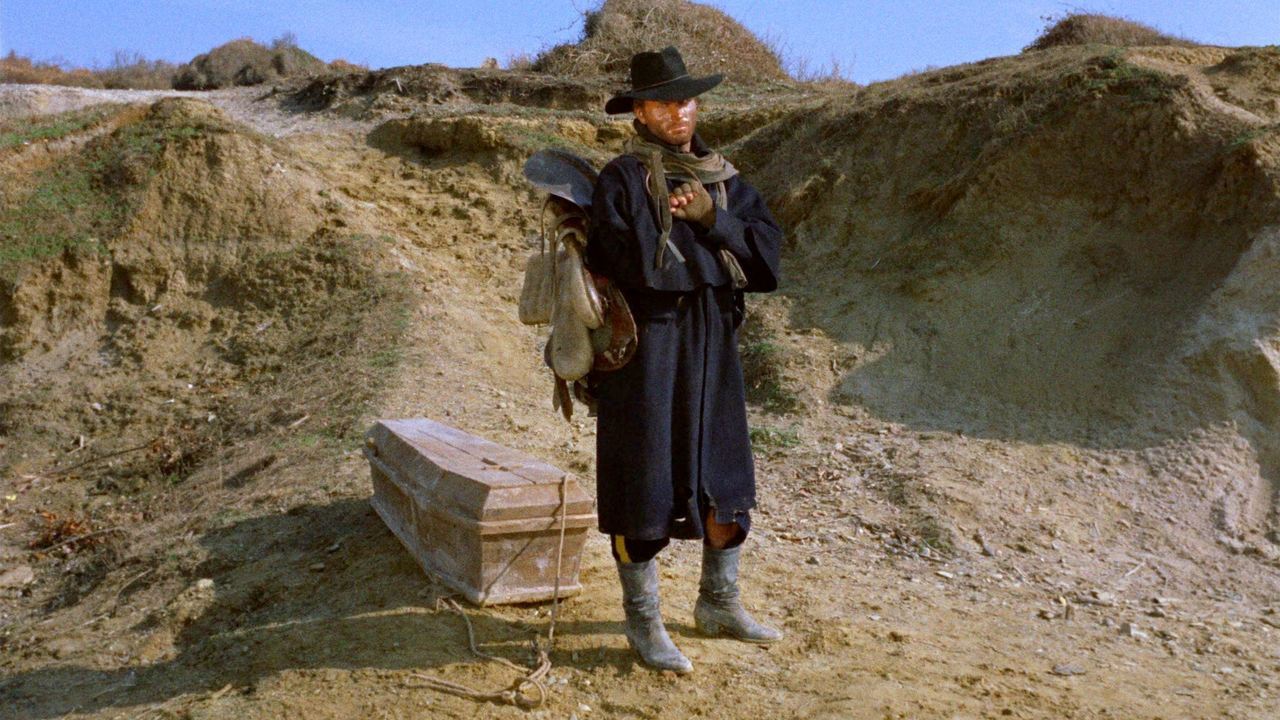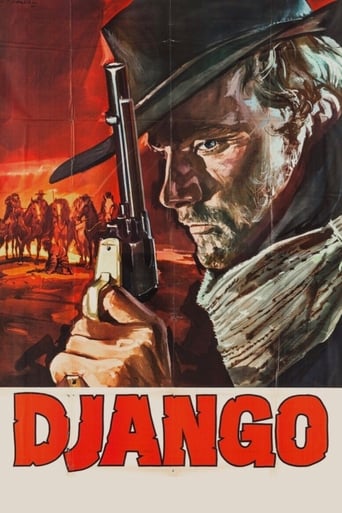TeenzTen
An action-packed slog
Ketrivie
It isn't all that great, actually. Really cheesy and very predicable of how certain scenes are gonna turn play out. However, I guess that's the charm of it all, because I would consider this one of my guilty pleasures.
Darin
One of the film's great tricks is that, for a time, you think it will go down a rabbit hole of unrealistic glorification.
Isbel
A terrific literary drama and character piece that shows how the process of creating art can be seen differently by those doing it and those looking at it from the outside.
Leofwine_draca
A classic spaghetti western yarn which proved to be so popular that it spawned at least two dozen sequels, remakes and rip-offs all of which traded in on the mysterious central figure of Django, a very visual character with a wide-brimmed hat, grey scarf, and long black overcoat, who drags a coffin through the mud behind him. Plotwise, the film is nothing new but another remake of the Japanese classic YOJIMBO, already made once as A FISTFUL OF DOLLARS. The two remakes, although both within the genre, are very different movies. Whereas FISTFUL was a film with strong characterisation, witty and quotable dialogue and good acting, Django has none of that. Most of the characters aren't developed at all, aside from Franco Nero and a couple of the leads, the acting is merely acceptable, the dialogue unmemorable.Where director Sergio Corbucci comes into his own is with his unique visual style. Instead of employing the same camera tricks as the one and only Sergio Leone, Corbucci instead creates a colourful movie in which the brightly-clothed characters stand out against a grim backdrop of mud, scum and ruin. There are some truly memorable and classic images in this movie, whether it be Django using his machine-gun to mow down dozens of red-hooded religious fanatics (who seem to be an early version of the Ku Klux Klan!), or the standout finale which sees Django - his hands now useless, raw and bleeding - attempting to load and fire his gun at the hit squad which has come to destroy him, all set in a down-trodden cemetery.Each character has his own unique colours and appearance to distinguish him from the rest making for a very visual movie to watch. While the music is a bit over-the-top and a far cry from Ennio Morricone, the shoot-outs are staged in a no-nonsense manner with plenty of style. Franco Nero - after supporting parts in the likes of THE WILD, WILD, PLANET - gives a tough, impassive and spooky performance in the title role which established him as one of Italy's top actors for years to come. Angel Alvarez shines as the friendly bartender caught up in the mayhem, as does Loredana Nusciak as a prostitute who falls for Django after he saves her from a whipping. Meanwhile, Eduardo Fajardo makes for a truly despicable villain as he shoots Mexicans for sport in the back as they run away.What makes this film so memorable is the legendary violence - something which caused it to be banned outright in the UK (so what else is new?). The scene every body remembers is where a man gets his ear sliced off in bloody, unflinching detail which easily gives a similar moment in RESERVOIR DOGS a run for it's moment. Other "highlights" include a man being shot in the face, and Nero having both of his hands mercilessly beaten to a pulp. As the film progresses, so does the death toll, and sweeping views of valleys littered with corpses are largely impressive. Most of the cast ends up dead by the time the film ends. DJANGO is a highly watchable movie with plenty of style and visual splendour to recommend it, one of the big boys of the genre.
utgard14
A man dragging around a coffin arrives in a muddy border town where he rescues a woman and becomes involved in a struggle between rival groups. Sergio Corbucci's version of A Fistful of Dollars (or Yojimbo, if you prefer), Django stands as one of the better second tier spaghetti westerns. Stylish and violent with nice direction from Corbucci and a good score form Luis Bacalov, including the catchy title song. Franco Nero is a handsome lead but he lacks the screen presence of a Clint Eastwood. He's also badly dubbed with a disconnected voice that doesn't remotely seem like it could come from him (because the unimposing voice belongs to Tony Russel). To make matters worse, Django talks a lot for a "mysterious stranger" type. Despite my complaint about Django's distracting voice, as well as some script gremlins I won't bother getting into, it's still an enjoyable movie. I love spaghetti westerns for their style and fresh approach to a genre that had largely grown stale by the time films like these were made. Some of them, like the ones made by Sergio Leone, were exceptional films that stood with (and sometimes above) the best American westerns. Others, like Django, were simply entertaining time-passers with some memorable elements but not much meat on the bone. Nothing wrong with that. This is a good, but not great, spaghetti western that will please die-hard fans of the subgenre but those seeking something more like Leone's work will likely be disappointed.
velocityonhorizont
Overrated spaghetti western movie. This movie have predictable and boring plot. There is no blood effect on bodies stricken. Dubbing Italian language is very bad. Everybody had same accent, even Mexicans. Belove average actors. Main role Django killing five villains in eye to eye combat.That is not realistic. Only town looks realistic for western films times. I was watched this film about 55 minutes, I really can't longer because that suppose to be torturing for me. I really cannot believe how somebody can give full 10 or nine for movie like this. They really shouldn't wrote reviews for movies. If you don't know what is good or what is bad movie please don't writing reviews anymore!!!
Robert W.
I know that Sergio Leone didn't necessarily create the Spaghetti Western but he certainly could be considered the King of the Genre. Django reeks of everything you would expect from a Leone film. If you love Leone's Westerns then you will at least enjoy Django. Many reviewers will tell you that this is on par or even better than the Dollars Trilogy (I completely disagree.) Certainly, it holds its own but if this were made nowadays people would cry foul and say how obviously blatantly copied this is from Leone's work. The brooding, dark stranger, the cunning but slimy Mexican bad guy, the warring factions...so on and so forth. I think the only reason I don't think this holds up to the Dollars films is that the characters and performances were very stiff in this. A few reviewers also said that Franco Nero was no Eastwood and as a HUGE Eastwood fan I can tell you that that is VERY true. He has the brooding part down but he doesn't have any chemistry on screen. He just doesn't handle the anti-hero role quite well enough. Feels strange saying that since the film is a cult Western classic that spawned multiple sequels and iterations so obviously something was done right.Franco Nero certainly looks heroic. He is tall and dark and has those piercing blue eyes. He guns his way through the bad guys with ease. He just didn't stun me. He didn't show the type of charisma that I am used to in Westerns like the aforementioned Eastwood or Van Cleef. José Bódalo is decent in his role but as expected the role is incredibly cookie cutter. Given the genre of film, that is to be expected. He does decently though and his scenes with Nero are well done. If Loredana Nusciak has a point as Maria...is she a romantic interest, the damsel in distress...I don't know if she pulls it off. She constantly looks like a deer in headlights and shows absolutely no acting ability in her role. There is no chemistry between her and Nero and when she does belt out a scream or line, it seems cheesy. Ángel Álvarez was particularly fun as the bartender. He was sort of the sidekick and sort of the comic relief and I would have liked to have seen more from him. Eduardo Fajardo fulfilled the villain position decently. I don't think the script gave him a lot to work with but he is a decent Western villain.Sergio Corbucci obviously enjoyed the Spaghetti Western genre enough to try his hand at it. It succeeds in many ways. It isn't missing anything that a fan would need. Although described as violent I didn't think it was nearly as violent as any of Sergio Leone's films. It has a few over the top moments but certainly nothing that would make anyone cringe. Well the film hits mostly the right notes, everything also feels a little dry, a little uninspired, and without true creativity. I'm actually surprised that it has such cult status and such a high review on here. Its not a bad film, its just not a unique Western. When you have such superior film making in Sergio Leone, this one feels like a sub standard clone. 6/10

